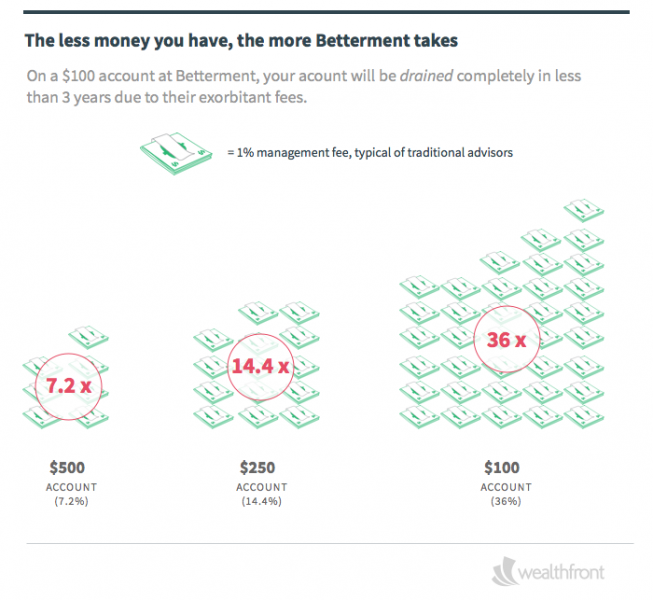Wealthfront announced Tuesday on its blog that it would lower its account minimum from $5,000 to $500.
Wealthfront said the second generation of its Direct Indexing technology, which automatically creates a portfolio of ETFs based on account size, risk score, investment plan and available ETFs, and its philosophy of keeping less than one percent of a portfolio in cash (a rebuttal to other automatic investment platforms that keep higher cash allocations) make it affordable for the business to serve such small accounts.
The Palo Alto-based robo advisor said it would continue charging a 25 basis point fee to accounts with more than $10,000. The only fee accounts smaller than that would pay is the embedded cost of the ETFs, that averages 0.12 percent.
Elliot Shmukler, Wealthfront’s vice president of product and growth, said the decision was made in response to requests from an increasing amount of young investors, even though there are other so-called robo advisors, or algorithmic-based asset allocation and rebalancing platforms, on the market that offer lower or no account minimums. The request from younger investors is, in part, a result of the firm's strategy to target that demographic even while competitors in the space try to move upstream toward more affluent investors.
“As we evaluated these services, we noticed that they have fallen prey to the excessive monthly fees that plague the traditional investment industry,” Shmukler said. “At Wealthfront, we believe everyone deserves sophisticated financial advice – regardless of your account size or your net worth. So we were disappointed that other services were taking advantage of younger investors — many of whom were just starting out with their first investment account.”
Wealthfront CEO Adam Nash accompanied the announcement with a post accusing competitors in the robo advisor space of repeating the hidden fee practice that made banks among the least-loved brands among millennials.
“The biggest sin running rampant across new companies? Exorbitant fees disguised as the “low monthly service fee” for small accounts,” Nash said, using Blooom, a startup that provides automated 401(k) advice for $1 per month on accounts with less than $20,000, as an example. “They might seem low in absolute dollars, but as a percentage of a new investor’s account, it is devastating.”
But the bigger offender, according to Nash, is Betterment, the New York robo advisor that doesn’t have any account minimums but charges a $3 per month fee for accounts that deposit less than $100 per month. According to Nash, a third of Betterment’s revenue comes from this fee.

“Taking advantage of those that can least afford it is not disruption,” Nash said. “It is not innovation. It is worse than payday lending, and it needs to stop.”
Though Nash complemented the engineers and designers at Betterment, the CEO implied that Betterment inherited the practice from one of its investors: Citibank. Nash said this is the reason Wealthfront has refused venture capital from traditional Wall Street firms.
Betterment said the claims are "inaccurate and blatantly misleading." The company encourages customers to deposit $100 per month to get on a behavioral track and reduces fees for larger accounts to provide a strong incentive to save. Though Citi Ventures contributed to a $32 million round of funding, Betterment said Citi has "zero involvement" in the company, no information rights, and no board seat.
Joel Bruckenstein,a financial technology analyst and founder of the Technology Tools for Today conferences, said Nash is right to say that $3 on every $100 deposited would get expensive, but that 35 basis points isn't significantly more than Wealthfront's fee of 25 basis points.
"Is Betterment a little more more expensive? Yes it is, for very small accounts," Bruckenstein said. "But until recently, [Wealthfront] didn't reach small accounts anyway."
The robo advisor market is fierce, Bruckenstein said, and it's still too early to call a winner. Cost is just one factor customers will consider when choosing a robo, and some may prefer a product like Charles Schwab's Intelligent Portfolio that doesn't charge any fees by keeping more of a portfolio in cash.
"[Wealthfront] is not the cheapest out there, but they just became cheaper and became more competitive."
On Twitter, a Wealthfront customer from Bozeman, Montana wasn’t impressed with the post.
@youderian @wealthfront Speaking up is never easy. But it's the truth, it's not OK, and someone had to say something.
— Adam Nash (@adamnash) July 7, 2015

